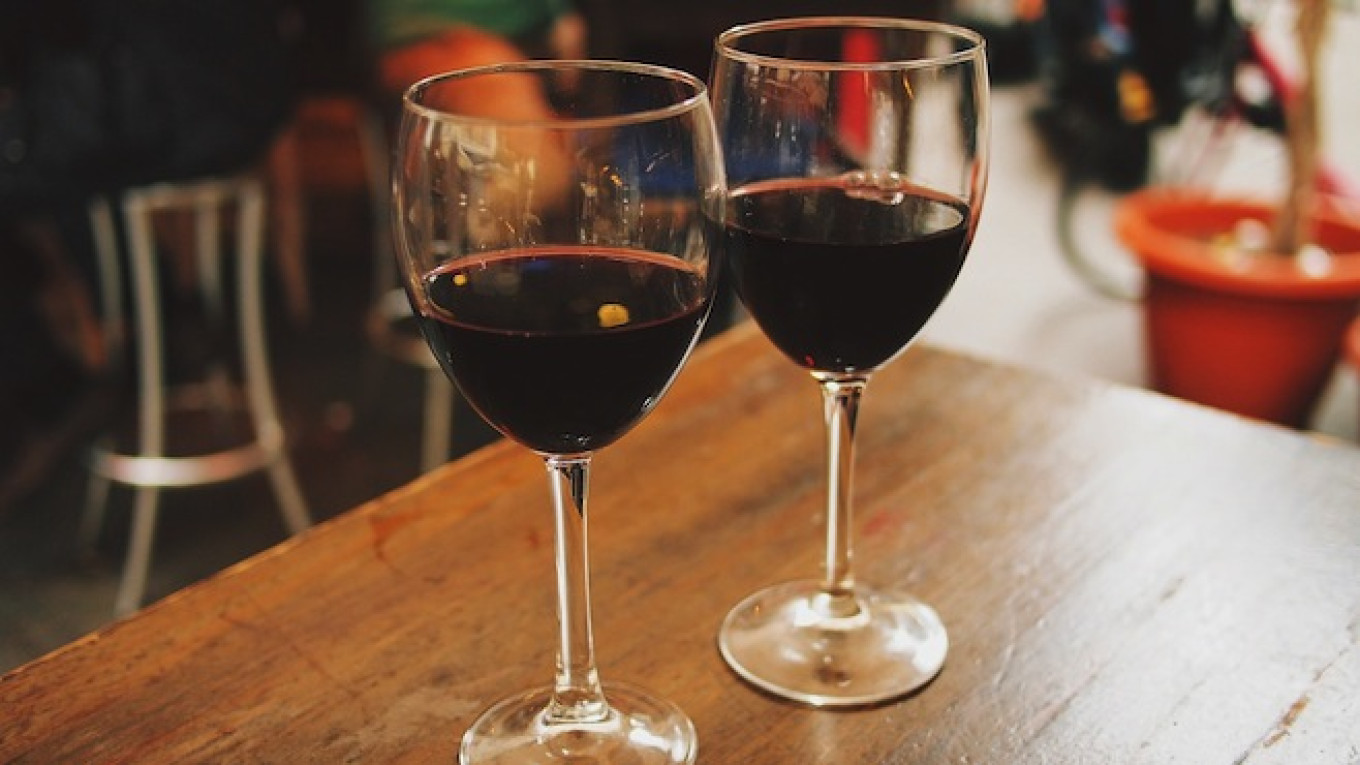The prices of both foreign and domestic wines are set to rise in Russia in the coming weeks because of the weakening ruble.
Starting in October, the prices for wine in Russian retail chains will increase by at least 15 to 20 percent, Vadim Drobiz, director of the Research Center for Federal and Regional Alcohol Markets, told The Moscow Times.
Some prices will go up even sooner. “We are raising prices for all products from Sept. 1 because of the ruble devaluation,” Vladimir Maslov, commercial director of the Moscow-based alcohol distributor Arte Del Vino, told The Moscow Times earlier this week.
It is unlikely that domestic winemakers will be able to fill the gap and replace more expensive imported wines because most of the raw materials used to produce wine in Russia are imported.
Last year Russia imported 16.85 million decaliters of raw materials for wine-making, Vedomosti newspaper reported Sunday, citing data from the Russian Federal Customs Service.
The country's own production of raw materials for wine totaled 30 million decaliters last year, Vedomosti said, citing the state statistics service Rosstat.
Russia consumes nearly five times more wine a year than it produces.
Russia, including Crimea, produced 350 million liters of wine last year, while Russians consumed more than 1.5 billion liters during this period, Drobiz said.
In a statement that has rattled the market and fueled additional fears that the price of wine will rise even further, Russian Agriculture Minister Alexander Tkachev said on Sunday that Russia could ban imports of foreign wine-making materials or significantly increase taxes on imported raw materials.
According to the minister, a sizable share of wine sold under Russian brand names is actually foreign.
“Our plants are just bottling wines. And this is unacceptable,” Tkachev told the state-run Rossiya 24 television channel.
The proposal comes as the Russian government pushes its import substitution policy in all key areas of industry. The country started to seek ways to cut its dependence on imports last year amid worsening ties with the West.
Tkachev's remark immediately draw criticism from industry analysts who believe a ban on imported raw materials will result in increased prices, output reduction and mass closures of wineries.
The minister's proposal is not the first attempt aimed at reducing the importance of imports to the Russian wine industry.
In June, Crimean winemakers called on the government to limit imports of European wine, in order to boost the Crimean wine industry. The proposal was supported by Crimean Governor Sergei Aksyonov.
The Agriculture Ministry, however, said at the time that the Russian market wasn't ready for a ban on wine imports as the country doesn't produce enough wine to satisfy? domestic demand.
If Russian officials go ahead and decide to ban imported raw materials, wine would become not only an expensive product, but also a scarce one.
Nine out of 10 bottles of sparkling wine sold in Russia are produced from foreign raw materials or are imported, which means if the ban comes into force in the near future, Russians will have no sparkling wine to celebrate the New Year with, business ombudsman Boris Titov said Monday, according to Interfax.
Russia currently has 86,500 hectares of vineyards, the RBC newspaper reported in May, citing state statistics service Rosstat.
According to Pyotr Romanishyn, CEO of Fanagoria, one of the largest Russian wine producers, Russia needs 350,000 hectares to provide the country with wine that is 90 percent produced from domestic grapes, RBC said.
Reviving Russian wine production will take years of hard work, said Drobiz from the Research Center for Federal and Regional Alcohol Markets.
“We can't talk about any import substitution in the wine industry until 2025,” he added.
In May last year Prime Minister Dmitry Medvedev announced a plan to expand the territory of Russian vineyards to 140,000 hectares by 2020, RIA Novosti reported then.
Contact the author at a.bazenkova@imedia.ru
A Message from The Moscow Times:
Dear readers,
We are facing unprecedented challenges. Russia's Prosecutor General's Office has designated The Moscow Times as an "undesirable" organization, criminalizing our work and putting our staff at risk of prosecution. This follows our earlier unjust labeling as a "foreign agent."
These actions are direct attempts to silence independent journalism in Russia. The authorities claim our work "discredits the decisions of the Russian leadership." We see things differently: we strive to provide accurate, unbiased reporting on Russia.
We, the journalists of The Moscow Times, refuse to be silenced. But to continue our work, we need your help.
Your support, no matter how small, makes a world of difference. If you can, please support us monthly starting from just $2. It's quick to set up, and every contribution makes a significant impact.
By supporting The Moscow Times, you're defending open, independent journalism in the face of repression. Thank you for standing with us.
Remind me later.


